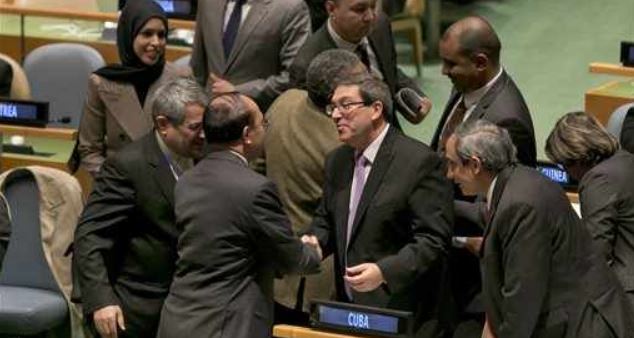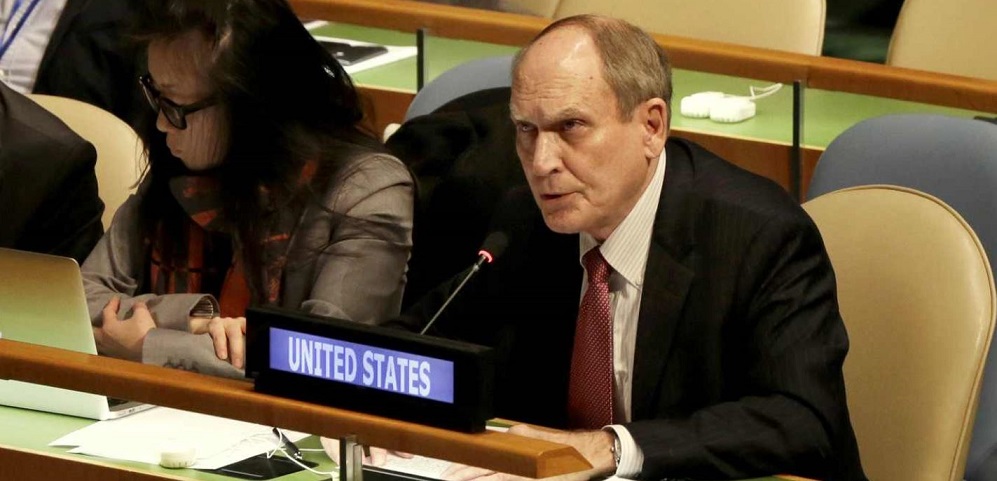
The United Nations faces off the U.S. Congress
HAVANA — The 24th consecutive condemnation by the United Nations General Assembly of the United States’ economic, commercial and financial blockade against Cuba took place this week.
It is, however, the first occasion in which it occurs under a new context, marked by the reestablishment of diplomatic relations between the two countries, which raised expectations about the behavior adopted by various governments, especially the United States’.
Some even predicted that, after criticizing the blockade in the U.N. building itself, President Obama would direct his delegation to vote in favor of the condemnatory resolution, or at least abstain from voting against it.
However, that didn’t happen and the vote turned out to be a crushing defeat for U.S. policy: a record 191 votes in favor, 2 against (the U.S. and Israel) and — this time — no abstentions.
The U.S. vote can be explained only by looking at the United States’ domestic policy. Evidently, Obama chose not to confront Congress by voting against a law passed by his own country and opted for letting the world tell it it’s wrong. This attitude has several consequences:
On one hand, it exposes the polarization that exists in the U.S. political body and weakens the President’s authority vis-à-vis the international community, which affects other areas of Washington’s foreign policy.
On the other, it raises the mistrust regarding Obama’s true willingness to face the challenges implied in defending his policy toward Cuba, which is reflected on an international scale, on a domestic level and in the United States’ very relations with Cuba.
Lastly, it shows Congress the evidence of the world’s rejection to a policy that only that body can amend in an essential manner. This also has internal repercussions, related to its credibility among the American people.

In the first case, Obama can do little to change a national and international perception that has an objective basis and is expressed in issues that transcend the Cuban topic, embracing instead the country’s entire reality.
The enormous discontent among the American people with its political institutions, especially Congress, is not casual, nor is the mistrust that such divisions generate in the rest of the world.
In the latter instance, Obama has a greater latitude for maneuvering if he acts with the necessary determination, uses his executive powers and guarantees the advance of the very measures that channel his policy toward Cuba.
So far, it seems that the President prefers to move in the belief that the media impact of the U.S. steps forward will be enough to improve his policy in the eyes of the world. The vote at the U.N. shows that this is not so. You need only read the speech of the representative of the European Union, who said that, more than ever, the blockade gave proof of being an anachronistic policy.
The real problem is that none of the measures adopted by Obama so far restrict the extraterritoriality of the economic blockade against Cuba. On the contrary, the barriers have increased, to prevent other interests from getting ahead in the Cuban market.
The same happens with Cuba. The blockade is an aggression that affects, in a practical manner, all the aspects of our national life and we observe closely President Obama’s true willingness to move ahead and lift it. As Foreign Minister Bruno Rodríguez said, in this case the friendly declarations and promises wrapped in alleged good intentions are not enough. What’s needed is solid facts.
So far, those solid facts reveal that Washington’s actions have been very limited and transparently oriented to promote specific interests of U.S. policy. Often, rather than a show of good intentions, those actions are interpreted as an insult to the intelligence of Cuba’s leaders.
Under such circumstances, Obama cannot hope that his country’s economic sectors, which are indispensable to advance his own strategy toward Cuba — even by applying other methods to achieve the same objectives — act vigorously with respect to that strategy.
It would seem that we’re at the stage of a public relations campaign where everybody wants to come to Cuba and discover opportunities, hoping to materialize them when a “force majeure,” say the U.S. Congress or President Obama, does something to enable them.
The tale that renewed relations depend on the transformations made and facilities offered by the Cuban side does not hold in practice. At least, it’s not essential at this time.
A Cuban government official told me that an American businessman with an overbearing attitude asked him if he could buy a certain Cuban business. With the shrewdness that, according to urban mythology, characterizes Cubans and in order to confront the American with his own contradictions, the official asked him if he was truly ready to enter negotiations for that purchase. The man told him that he couldn’t at this time because his government didn’t allow it.
This is the one and only reality.
The only positive result achieved by Obama — or perhaps U.S. policy, after the recent debates at the U.N. — was to confront Congress over the evidence of its own ineffectiveness, created by the aberrations of the system.
The Torricelli and Helms-Burton laws, which codify the economic blockade against Cuba usurp the prerogatives of the Executive Branch regarding the nation’s foreign policy, as expressed by the U.S. Constitution itself.
Thanks to generous financial contributions and the convenience of the electoral architecture, those laws were passed to satisfy the interests of the Cuban-American extreme right and placed U.S. policy toward Cuba in a medium totally outside the requirements of foreign policy, limiting its chances for change.
It matters not that more than 70 percent of Americans support Obama’s policy toward Cuba, that the economic sector can benefit from it, or that U.S. citizens claim their constitution right to travel freely to the island.
A small group of legislators and a little bit of money have been enough to kidnap U.S. policy toward Cuba, contrary to what the majority recognizes as the national interest.
Next year, deciding how to vote at the U.N. on the question of the Cuban blockade could be one of the last decisions made by President Obama. Let’s hope that he’ll be capable of acting so that he doesn’t find himself again in the same bind.
[Photo at top of Cuban Foreign Minister Bruno Rodríguez being congratulated at the U.N. General Assembly after the vote on ending the U.S. blockade.]
Progreso Weekly authorizes the total or partial reproduction of the articles written by our journalists, so long as source and author are identified.

